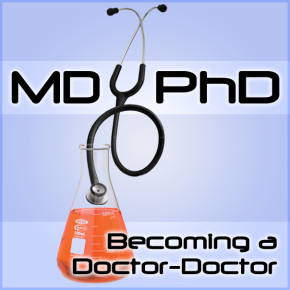As a newly-minted third-year medical student, I’m now reaching the point where I finally have to decide what I want to be “when I grow up.” (I use that term very loosely since I’m in my late 20s, have spent 23 years of my life in school, and already have one doctorate degree). Which areas of medicine should I pursue? Do I want my future practice to be clinically-oriented, research-oriented, academically-oriented or all of the above? If I go the research route, do I want to pursue a similar area to my doctoral research in cancer biology, or embark on a new field altogether? What can I do now to figure this out, since I’ll be applying for off-site electives next semester and submitting my residency applications in less than a year’s time? How can I identify residency programs that will be a good match for my goals? In which parts of the country might I be open to living for the next stages of my training?
I’m still working out the answers to these questions, by talking to colleagues and physicians and making heavy use of comparative spreadsheets, Google, Zillow and other tools. But I do feel fairly confident about one thing: my desire to pursue a research career — to truly be a physician-scientist. On the one hand, virtually every specialty provides the opportunity to be involved in research. However some specialties appear to accommodate research quite well, whereas others make it seem like it would be very hard to juggle a burgeoning research career in addition to maintaining an active clinic, managing odd shifts and demanding call schedules, and spending sufficient time doing procedures to keep your clinical skills fresh. My interest is in a practice that is at least 50 percent research, preferably beginning early in residency training, and for that reason I’m looking into fields where clinical practice will integrate easily with research.
In the midst of these self-reflections, I’m spending my days (and occasionally nights) on the wards, in the clinic and in the OR. It’s an entirely new, uncharted world compared to the bench, a domain in which by the end of my PhD studies I felt very comfortable. UpToDate has largely supplanted PubMed, and awesomely knowledgeable nurses have replaced lab mates, techs and Google when it comes to finding out how things work. I start each rotation knowing very little about how that field functions and spend the first couple of weeks overwhelmed in a sea of unfamiliar terminology, procedures and drug names, before finally getting comfortable just when it’s time to take the shelf exam and move on to the next rotation. It’s truly a privilege to be invited to a patient’s labor and delivery, operation or even their routine clinic appointment. I try to remind myself of this during times when I’m sleep-deprived, working crazy hours or spending what seems like hours retracting or coaching a laboring patient.
So far I’ve completed OB/GYN and am midway through surgery. As a whole, I’ve been inspired by the people I meet along the way. I make it a point to learn something besides clinical knowledge from every physician I work with so that I can try to emulate their behavior in my future practice. One of my attendings has a very patient, nonjudgmental manner with patients who see her for very sensitive issues. Another has a great way of explaining procedures by using common analogies to help patients understand the process. Another is a fantastic conversationalist who can put patients at ease when they feel vulnerable. Many are extremely dedicated to patient care and developing their clinical knowledge, but also manage to keep up with everything else that’s important to them: relationships, family life, physical and emotional health and personal growth. They do this while maintaining a positive, upbeat attitude through it all. Overall I feel very inspired and encouraged by these encounters.
At the same time, I am still working on the foundations of my own clinical and research careers and am seeking out my own opportunities to expand and refine my skill set. Earlier this year I presented my first clinical poster at a local research symposium with the help of a resident and an attending physician. I’ve presented close to 10 basic science research posters during my undergraduate and graduate research days, and I have that process down pat: assemble a storyboard, make and remake figures, meticulously resize content on a PowerPoint slide and then make the font as small as legibly possible so everything fits. In contrast, learning how to assemble and present a clinical vignette was an entirely new process. “Materials and Methods” becomes “Hospital Course,” “Results” becomes “Lab Findings and Imaging Studies,” and so forth. Another one of my strong interests is in teaching and education, so I’m continuing to tutor first-year students at my school, as well as working as an author on various First Aid resources, including the upcoming 2016 edition of the book! It can be hard to fit in time to work on these things while also focusing on clerkships, maintaining important relationships and sleeping, but the work is enjoyable and rewarding.
I’ll keep you updated as I progress through my rotations and work on figuring out where I’m going from here!
MD/PhD: Becoming a Doctor-Doctor
This column explores the MD/PhD career track from a current trainee’s perspective, including the benefits and challenges of pursuing two doctoral degrees simultaneously, time management and life balance, and post-graduation training and career opportunities.

